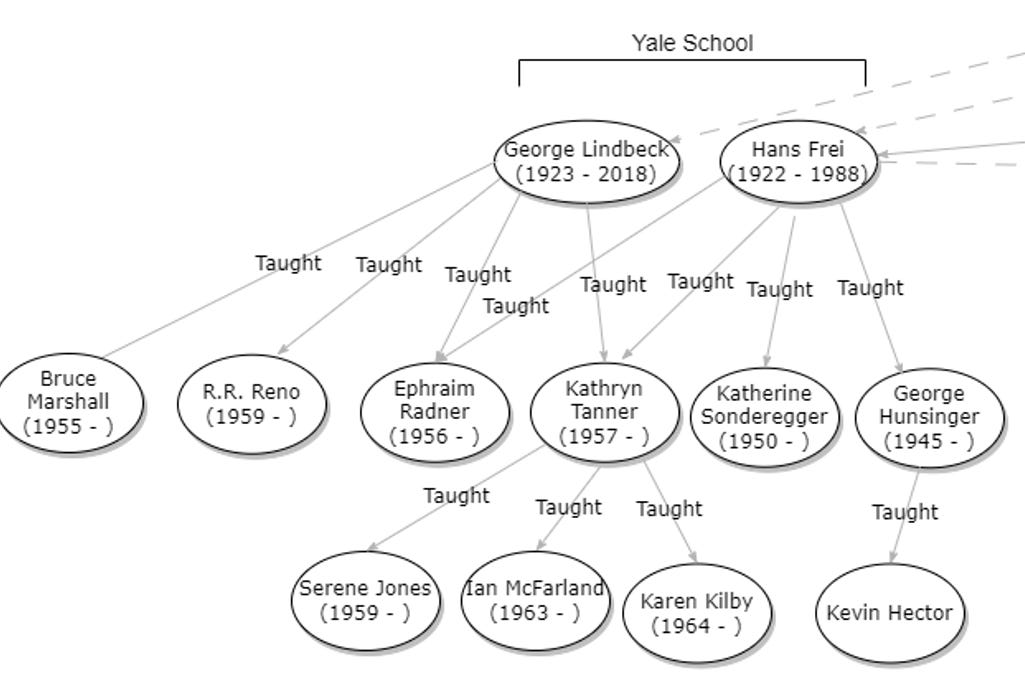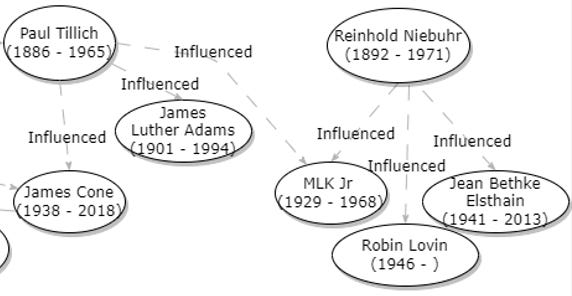Mapping Mainline and Evangelical Theology
Making sense of something requires knowing its history
Mainline Theology
A friend of mine asked if it would be possible to do some kind of theological family tree for western theology from Barth through the 2010s, so I pulled together the diagram below. Some of this requires a great deal of sleight of hand in simplification, but the result was interesting. Even where students are reacting against their teachers (e.g., Kathryn Tanner and the Yale School, Cone and Barth, J. Kameron Carter and Radical Orthodoxy), it helps to make the lines of influence explicit. More than anything, mapping this all out reminded me that almost all vital mainline theological projects (the kinds taught at schools like Yale, Duke, Princeton, and departments filled with their students) trace back one way or another through Karl Barth. Love him or hate him, his legacy and influence demand engagement.
Also interesting to see here are the many seeds of mainline influence slowly making its way into evangelical thought and institutions through figures like Kevin Vanhoozer, Peter Leithart, and J. Todd Billings.
(The chart is easy to read on the browser / email version but might not be legible on your phone’s Substack app. Including some section-by-section screenshots below for those too lazy to pull it up properly).
Thanks to everyone who has helped with this (it came a long way in between the first and current version). If you see any big errors or grievous exclusions, let me know and I will try to make further revisions.
UPDATE: Peter Hartwig graciously pointed out that I am incorrect in indicating Moltmann studied under Barth. They corresponded, there were certainly lines of influence, but no institutional teacher-student relationship.
Even better, Peter knows this because of an embarrassing interaction where his father made the same mistake as I have here, asking Moltmann “what it was like to study with Dr. Barth?” to which he replied, “I never did.” There might even be audio of the interchange, which Peter has promised to try to hunt down.
Evangelical Theology
Image courtesy of Lancia E. Smith Photography
Os Guinness: The Christian Public Intellectual After Jacques Maritain
Having studied religion in secular and mainline institutions, I am not at all equipped to properly map out this sort of thing for evangelical theology in the 20th century. I do think that someone should take up this project, even if only focusing on the reformed branch of evangelical theology (perhaps beginning with the founding of Westminster Seminary in 1929).
However, I attempted something in a similar vein last year (let’s call it a “delving” rather than mapping proper) with the legacy of Os Guinness, which just so happens to reach back in interesting ways beyond Guinness’ birth in 1941 to Catholic philosopher Jacques Maritain (1882 - 1973) and the founder of L’Abri, Francis Schaeffer (1912 - 1984).
Somehow, despite publishing one of the turn of the millenium’s most popular Christian books (The Call: Finding and Fulfilling the Central Purpose of Your Life), no one has written at length on Guinness’ life and works. Not only did he write The Call (and dozens of other books), Guinness was—like Maritain with the Universal Declaration of Human Rights—critical in the drafting of many documents like The Williamsburg Charter that sought to set the terms of public life for decades to come. You can read more about Guinness and what became of these monumental endeavors in the piece I wrote for Mere Orthodoxy (it’s even prettier in the print edition, which you can subscribe to future issues of here: https://ezsubscription.com/mer/subscribe
Speaking of subscribing, you can do so below. I think this is looking like it’ll be a once-a-month kind of thing. Next time, I’ll be mapping Kristin Kobes Du Mez’ Jesus and John Wayne.









This is a great model .
Another branch you could add to the tree from Barth , that gets into the mapping of more Evangelical commentators , would be Wolfhardt Pannenberg (whom Lutheran commentator Jordan B. Cooper would consider alongside Moltmann, Barth et al as a key figure in the "Quest for the Historical Jesus"), subsequently followed by John Piper who studied under him in Munich, an interesting connection into Evangelicalism.
Other than, that I'm not super aware of many 'primary' connections between the 20th century Barthian-influenced mainline thought and what most would consider Evangelicalism. It seems that many Evangelicals would draw (explicitly or implicitly) from other epistemological / hermeneutical sources (Alvin Plantinga), or older figures such as George Fox.